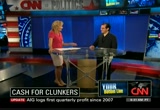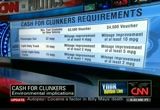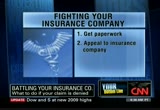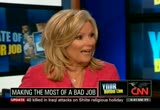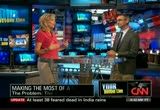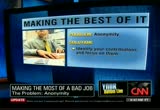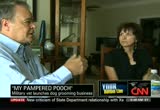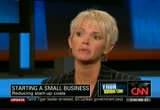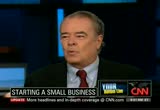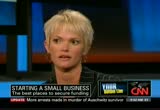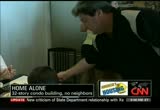tv Your Bottom Line CNN August 8, 2009 9:30am-10:00am EDT
9:30 am
>> sounds good. >> i don't know. it's a culinary concoction that is creating quite the buzz at the wisconsin state fair. >> check it out. the sheer notion of this unusual snack on a stick, makes some a little squeezy but the fans say chocolate bacon is a delicious mixture of salty and sweet. fairgoers who can't stomach that treat there's other favorites like cream puffs, good old fashioned wisconsin cheese as well. >> it amazes me the food you find at state fair. they'll deep fry about everything and apparently put chocolate on about anything as well. >> well "your bottom line" with personal finance editor gerri willis starts now. >> hello. i'm gerri willis and this is "your bottom line," the show that saves you money, become an empowered patient, tips to wage a battle against your insurance company if your claim is denied, making the most of a miserable job solution that don't involve sacrificing your paycheck and starting a small business.
9:31 am
grab a pen and paper. we'll show you how. "your bottom line" start right now. cash for clunkers, some say a big success. others argue poorly planned by the government. the program burned through its bill lon dollar first round of funding in less than one week. now with $2 billion more headed on the way, how long can we expect it to last? jack is the chairman of smart transportation.org. you helped design this plan so we really got the person who knows the most about it with us today. i want to share some numbers we have, though, and ask you about them. >> sure. >> total number of clunkers out there, some 40 million. even with the $2 billion, we're going to take out less than a million of these clunkers. is that enough or are we really getting traction against the problem the president says he would like to fix? >> well, cash for clunkers is a start. it's a program that we need right now because of the issues and challenges of the auto industry. we've got to help the auto
9:32 am
industry. we've also got to help the consumer. you have million of consumers that have the clunkers and costs them a lot to fill it up with gas at the pump, costs them a lot to go back and forth to work with this clunker. on average people who trade in their chunkers are saving $750 a year in gas with their new car. >> as that price goes up, they'll save even more, right? >> at $2.60. imagine if it goes back to $4. we're predicting gas will go back to $4 within nine months. >> back to $4. >> you heard it here first. we're headed back up for the gas prices. why, though? >> we went from $1.45 to $2.70 this week, we're moving up there because you have demand coming back as the recession ebs a little bit, and demand comes back and china starts buying more car. >> that's all pressure for higher prices. let me get to some of the other issues for cash for clunkers. under the program newly purchased cars have to have an efficiency of 22 mpg.
9:33 am
not that impressive. >> not that impressive. we were asking for much higher. we wanted a minimum of 25% above cafe, that is 33 miles per gallon. >> that's impressive. >> but there was a compromise in the congress, a lot of people there fighting for the u.s. automakers, we were fighting for higher efficiency and the u.s. automakers, in the end the compromise was 22 mpg. here's the good news. consumers are voting with their wheels for higher efficiency, trading in cars 60% now higher than the ones they brought in. >> one of the goals was to get americans to buy american cars, it's not working. i mean you look at the list of cars in terms of popularity. >> sure. >> they tend to be japanese. >> it is working in several respects. first, 45% of the cars being bought are from the detroit big three. second, a lot of -- most of the toyotas and hondas bought are made in america by u.s. auto workers in tennessee, alabama,
9:34 am
and kentucky. >> wheels with wheels. the companies are not in this country, but -- >> they're making the cars here. >> after cash for clunkers do we get a new program that takes its place? >> that's a great we. we got $2 billion more for our program. we have $3 billion. i think we'll get one more billion, but $4 billion, about a million cars taken off the road and a million families put in a new, more efficient car, now having less of a gas bill every single year. >> but you have been talking about something you call feebait. a tax on people who actually buy gas guzzlers. now we're not just incenting people to buy full-efficient cars, we're penializing people who don't. >> cash for clunkers costs a lot of money, $4 billion in this case. we want to look for a way for doing that so the u.s. taxpayer that doesn't have to lay out case. one way that's proposed is a
9:35 am
feebeat. if you want to buy a guzzler, big escalade or suv, you pay an extra fee. on the other hand, if you want to buy a high mileage car you're going to get a rebate. that one matches the other. it's revenue neutral. but we want to send a message to the consumer with pricing, that we want you, the consumer, to please buy a high mileage car because you will have lower operating costs of that vehicle. >> in other words, buy your escalade now. jack, thanks for helping us out today. we appreciate it. >> thank you, gerri. health care reform a hot topic in washington as congress heads home for its summer recession. senior medical correspondent elizabeth cohen joins us from atlanta to discuss one of the most common complaints about health insurance, that the insurance companies deny claims they should pay. elizabeth, what should you do when an insurance company denies your claim? >> gerri, you know how in real estate everything is location, location. patient advocates tell me when you're fighting an insurance denial, the words are fight,
9:36 am
fight, fight. you need to keep fighting it. let's take a look at some specific tips we somewhere from the empowered patient columns about how to fight an insurance company when they're denying a claim they aud to be paying. first of all get all the paperwork so you can prove your case, that means the paperwork from your doctor and insurance company and then as i said, fight, fight, fight. that means appeal your insurance company's decisions. advocates tell me most of the time when people appeal, they actually get their way, which is pretty interesting. >> elizabeth, so you don't have to be satisfied with the first answer. you can actually ask, hey, i don't like what you told me, i'm going to continue to appeal this? >> absolutely. the advocates that i talked to said they have people who have appealed four times and it took four times, but finally the insurance company agreed to pay. so that's a great point, gerri. if they say no the first time, keep going. also ask your original doctor for help. say, doctor, they're not paying for this procedure that you did, can you help me out here and call the insurance company. doctors are usually happy to do that. now, finally, if all else fails,
9:37 am
get yourself a lawyer. again, the advocates that i talked to said sometimes when the insurance company says no, over and over again, the minute they get that letter with some legal letterhead on it they actually will cough up the money. >> what about avoiding all these problems in the first place? i don't want to have to go through a long appeals process. i want to get action now. how do i do that. >> you need to sort of get everything in order before you actually have any procedures. so the first thing you want to do is you want to check with your insurance company, are there any things that they generally never ever pay for. in vitro fertilization is a great example. some insurance company policies say we don't pay for that. that's a general exclusion. you want to check that out before you get an expensive procedure. also, again, get everything in writing. whether it's from your insurance company or from the doctor. and that's that sort of lead flows tip number three, don't trust your doctor when it comes to insurance. trust them for medical things but not for insurance things.
9:38 am
for example, we talked to somebody who -- where the doctor said, i'm going to do lasik surgery on you and i called the insurance company and they said no problem, we'll pay for it. well, it turned out the doctor had it wrong. they don't quite know what happened in the communication there, but the doctor wasn't right. the insurance company never did promise to pay for it. so don't trust your doctor. get it in writing from your insurance company. >> elizabeth cohen, great information. thank you so much. >> thanks. all right. most people have something they don't like about their jobs. listen up, now is definitely time not to quit. how to make the best of a bad job, next. or just one brita filter. ( drop plinks ) brita-- better for the environment and your wallet.
9:39 am
9:40 am
it's super absorbent. and it works extra hard for your money. in this lab demo, one sheet of bounty extra soft out-scrubs two sheets of the bargain brand. game on. bounty extra soft. look for new prints. employment numbers released this week show workers are still feeling the recession even as many are saying the u.s. economy is beginning to recover. the latest report shows a loss of 371,000 jobs from private sector and that is the smallest monthly loss since october. the report was better than
9:41 am
economists earlier prediction of 350,000 jobs for the month of july. clearly if you're unhappy with your job you need a solution that doesn't involve giving up your paycheck and re-entering an already unstable job market. tom mussback, managing editor of yahoo! hot jobs joins us now. you have some really interesting advice here, tom. i want to tell viewers out there, recent survey according to a recent survey, some 54% of workers said if i could leave my job i would and what's more, as soon as this economic downturn is over i'm going to look for a new job. are you surprised by those numbers? >> no, i'm not. a lot of people have difficulties in their jobs. they like to complain about their jobs. but given the tough environment we're in, they feel kind of stuck so a lot of people, yeah, that's the main feeling they have is they're stuck in their job. >> let's talk about some of the problems and how you should fight back against them. if you have a bad boss a screamer, someone that doesn't appreciate your work, what do you do? >> well, sometimes in those
9:42 am
cases, communication also is a real problem. so make sure that you schedule frequent update meetings with your boss so you can get on the same page about, you know, certain issues or things that need to be done. and also when you do go to the boss, make sure that you present solutions. often people come in and talk about problems. and we learned as kids no one likes a complainer and that's definitely true with your boss. so be solutions oriented. >> okay. some people are just bored. let's face it. especially now, some people are kind of sitting on the sidelines because there's not a lot of money to do things, they want to be involved, they can't. what should they do? >> that could be a matter of setting some new goals. if you don't have goals, definitely set some goals. if you can, you know, set those up with your boss in agreement. or maybe just set personal goals. the point is, to have some measure of achievement. you want to know what success means in your job and have ways to measure that. >> you can develop your own definition of what success is,
9:43 am
right? >> true. true. >> okay. so some people, too, feel i think like i work in a big company, nobody knows my name, i'm invisible. how do i break through that anonymity? >> right. a lot of people feel like oh, my job doesn't matter to anybody, and it's good to sit back and really think about, okay, who does my job affect? how does it make a difference in someone's life? if you can look at it that way and focus on that relationship, even if it's just one co-worker that your job makes a difference for, if you can focus on that, that can often change your perspective and make you feel -- if you know that your job is making a difference to somebody, that can really make a difference to you. >> you know, it occurs to me, tom, that if you employ some of these tactics you might come to the realization that your job is better than you thought it was? >> that's right. that's right. that's a great thing to have in this economy because people want to hang on to their jobs. if you can change your perspective on your job, that's fantastic. >> all right. tom, thanks for your help today. we appreciate it. >> thank you. >> now if you've just received a
9:44 am
pink slip or just worried you may be next on the chopping block, it may be time to get some retraining. one free option the department of labor's local one stop career centers where you can attend free classes on job preparation and computer training. go to servicelocater.org for details. you may want to consider an apprenticeship a combination of job training and classroom education. check out the department of education's website for information on paid programs, paid, where you can work with chefs, electricians or carpen r carpenters or a number of other trades and learn a new job. up next, why now is a great time to start a small business and how to do just that. that maybe has to choose between paying their credit card or putting food on the table and that's why they call us. our main objective is to reach out to the customers that are falling behind on their payments. a lot of customers are proud and happy that bank of america actually has a solution to help them out with their cards.
9:45 am
i listen. that's the first thing i do is listen. you know what, what happened? what put you in this situation? and everyone's situation is different. we always want to make sure that we're doing what's best for our cardholders. i'll go through some of his monthly expenses, if he has a mortgage payment, if he pays rent. and then i'll use all that information to try and see what kind of a payment he financially can handle. i want to help you. bank of america wants to help you through this difficult time. when they come to you and they say thank you, aj, for helping me with this problem, that's where we get our joy from. that's what motivates us everyday.
9:47 am
unemployment is high, the recession is dragging to an end, but is now a good time to start a small business in joining us now are two small business experts danny and john. all right, guys, tell me why i would start a business now? >> because today, everything is on sale half price what it would be in a normal economy. you can get people, you can get office space, you can get all the materials you need, so go out and do it and you will be a hero if you do. >> save money. what else, danny? >> if you can build your business now today when consumers begin spending again
9:48 am
you will have a full place business. you can save money, buy equipment, get talented people looking for a job for a little less than you have in the past. >> you spent time in georgia with a out of work military vet looking to find a financial sound way to follow her dreams and become her own boss. to fulfill her dreams. let's look at her story. >> reporter: in the eight years since retiring from the air force, laurie has had three different jobs. quit one and was laid off twice. after the last layoff in february she started rethinking her options. >> i started thinking, i'm tired of going through this. what would i really enjoy? >> reporter: her aging husky inspired her to set her sights on opening a dog grooming business in the upscale atlanta suburb of peachtree city. money was tight. >> it is not doing anything like i hoped it would do, but it's
9:49 am
more money than i had last week. >> reporter: fruit is only bringing in a few hundred dollars a week, which isn't nearly enough to launch her business, compared to that, dog grooming looks like a gold mine. >> people spent $42 billion on their pets alone. you know, it's there. how do i -- how do i get in i want in. >> all right. so guys, laurie is such a great of what's going on out there with people who do want to start their own business. i want to talk a second where to go for money, because that's clearly one of the big problems here. friends and family, banks, what do you do? >> first thing to understand is you probably don't need as up money as you think you need. people come to us with business plans we need $1.2 million. break it down dollar for dollar. get rid of what you can, push as much length as you can. you might find you need 10% as much. when you do, then go to every source you can, from family to the banks. >> now, when you talked to
9:50 am
laurie you actually dialed back her expectation of expenses quite a bit. she thought she would spend in the first three years some $380,000. no. more like $210,000. do people consistently overestimate how much they're going to spend and how do they get good estimates? >> they do. first of all, people are not looking for the cheapest resource, not looking online for equipment. it laurie's case, 3.2 million tomatoes to make her dream happen. $100,000 off of start-up costs, leasing agents, vendors telling them we need a substantial break and wand a vendor-based financing. another way to knock off costs and finally -- >> financing means what? >> go to the vendor say i'm willing to buy your equipment but i need six month, 12 months to pay, a lot of vendors are willing to do that if you've got good personal credit. >> to be a financial success over the long run, face it, half of all start-up businesses fail in the first five years.
9:51 am
what's the secret? >> the guts to do it. laurie's a legitimate hero. she's not going to fail in that department. >> that's important, but let's talk about real strategies that will really get you started? >> real start jis learn with small mistakes in the beginning. lose small amounts of money. accelerate revenues, buy materials businesses going broke or going out of business. you can save half. it's a beachhead one dollar at a time. small business isn't a thing you magically one day open up and it's a success. most businesses fail. but most of the owners of the failing businesses come back and try again. >> scale up and scale up as you find small successes. >> one strategy. a lot of people that run businesses want 2000 square feet, you really need 1,000, for example to open a business. maybe you don't need a place on the road to open their business. sometimes it's a matter are looking at your dreams in stages and not just going for the gold
9:52 am
originally. taking baby steps to good there we've by far found that to be a successful strategy. >> byob, yob own bank, not bring your own bottle. >> know your stuff. i started a business $10,000 on gucci bags on ebay. >> sold your gucci bags? >> but then had to buy a lot resale until i could resell them retail. a few years old, people still bought them. so many places to do that. >> look in the garage, in the closet. anything you're not using can be sold to somebody, also the things you need are already probably owned by somebody else. don't let them off the hook. >> one word for people out there trying to start a business today. what would you say? bit of advice, bad economy, what should they do? >> make a very strong relationship with a community banker that knows and don't go in asking for one hundred grand. >> spend less.
9:53 am
9:56 am
an outlet from a buy bank. deutsche bank, 14% homeowners underwater, owning more than their house is worth an estimated 25 million americans with a major drain on their financial health. and now, a look at two very different stories when it comes to america's housing. up first, home alone in fort myers, florida. our affiliate wxt xwchlt. >> reporter: new jersey fire captain and his wife kathy dreamed of retiring in southwest, florida, and ultimately leaving this riverfront condo to their children. >> we sold the house in new jersey and used that money as down payment for this building. this is everything we got, we've put into this. >> reporter: an oh ais it is not. eight months after closing they're the only ones who live in this 32-floor tower who they expected to be a bustling
9:57 am
community among restaurants, a movie theater and arena. instead, isolation. >> like a scary movie. >> reporter: health and sachty hazards abound. this trash outside their door, a dark and deserted parking garage and lack of promised security. >> the fire alarm system, which is my business, as a fire official, has been out of service. intrusion june 29th, a month ago from today, somebody came into the building somehow and was pounding on the door where the room next to where my children are. >> they saw a lifestyle and that lifestyle has fizzled. >> reporter: their tone john thin yewing it working to get them what they paid for or get them out. >> the related group says the family is welcome to move to the second tower while they tried working out the transition with their lender to relocate next door. the builder says it has not discontinued service or done anything to make life uncomfortable for the family but are under no contractual
9:58 am
obligation to buy back the apartment. now a road trip to denver where the term pedaling homes takes on a whole new meaning. our denver affiliate kusa explaining. >> reporter: ditching the car or bike really isn't a if you aspect for coloradans, why this was a no-brainer. >> a lot of people are like, oh, of course. bikes. just kind ever the perfect way to go. >> please wipe your shoes before you head in. >> reporter: this has been done in other cities and this summer she decided it was time to start her own tour to show off houses in northwest denver. and the idea is catching on. >> all pent up at work. it's good to get out on the weekends. >> this is awesome. >> reporter: and into several houses. usually five or six with two hours. >> instead of driving around from open house to open house, i set them up four and you get a
9:59 am
variety of homes to go look at so that you can kind of narrow down the kip of home you think would fit your personality. >> so this house listed $2. 000. >> reporter: others benefit from the traffic these group rides offer. >> having six people come through a house at one time you get a wonderful amount of exposure. >> you can be excited together. like a little kid in a candy store getting to go into new houses and see new things. >> reporter: the biggest bonus of biking has to be noticing what's outside that new house. >> you see so many different things riding your bike. you just fly by at 60 miles ap hour in your car and you miss. >> reporter: because it's not just about purchasing the right home, but also buying into the right neighborhood. heidi mcguire, 9 news. sounds like a fun way to spend a weekend afternoon. as always, thank you for spending part of your saturday with us. "your bottom line" will be back next week right here on cnn. you can also catch us on "hln" every saturday and sunday at 3:30 p.m. eastern
224 Views
IN COLLECTIONS
CNN Television Archive
Television Archive  Television Archive News Search Service
Television Archive News Search Service 
Uploaded by TV Archive on

 Live Music Archive
Live Music Archive Librivox Free Audio
Librivox Free Audio Metropolitan Museum
Metropolitan Museum Cleveland Museum of Art
Cleveland Museum of Art Internet Arcade
Internet Arcade Console Living Room
Console Living Room Books to Borrow
Books to Borrow Open Library
Open Library TV News
TV News Understanding 9/11
Understanding 9/11
